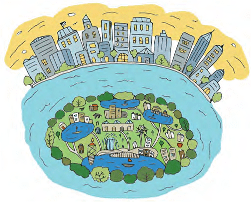EVEN AS SHE WELCOMES A REFUGEE FAMILY TO COLUMBIA, OUR COLUMNIST BIDS FAREWELL
story by Heather
June/July 2017
Almost a year ago now, my church began to work to resettle a refugee family in Howard County. We raised money, recruited volunteers and signed on to the Good Neighbor program run by Lutheran Social Services. We were finally assigned a family in January of this year: a dad, mom and four children from Afghanistan.
We pored over the few pages of information we received about the family, searching for clues about the people we were about to meet. We were told that the father had some skills in spoken English but the mother and the four children had none. So when we went to meet them at the airport in mid-February, we were prepared. We smiled and waved and said, “I’m glad to meet you” slowly and just a bit louder than necessary.
We knew we had a long drive ahead of us, so we gently nudged everyone toward the bathrooms. The 6-year-old walked into the bathroom stall, put her hands on her hips and loudly exclaimed, “Oh. My. God.” She sounded as American as our own children. We quickly realized that all the kids were fluent in English thanks to a school for refugee children they had attended during their three-year wait to enter the United States.
I thought that refugee children would be traumatized and shy. I imagined they might arrive clutching their mother’s skirt in one hand and a dirty rag doll in the other. I wasn’t anticipating bold and talkative kids who love playing video games and know a great deal about Taylor Swift’s private life. When we knocked over some cereal boxes in the food store and one of the girls exclaimed, “That’s a hot mess!” I almost fell over.
“Do you like ‘Frozen?’” I asked, making conversation with the oldest. “‘Frozen’ is okay, but I really like ‘Moana,’” she told me, referring to Disney’s most recent offering about a Polynesian girl who leaves her island against her father’s will. “Moana is brave! I want to be like her. I want to have an adventurous life!”
Because of their fluency in American pop culture and their liberal use of American slang, these children were able to step right into Howard County public schools. They quickly made friends with kids in their class and joined in with soccer and Girl Scouts and roller skating on Saturday afternoons. If you saw them out on the playground now, you wouldn’t have a clue that these kids are refugees.
So I occasionally have to remind myself about something an Afghan translator told me a few weeks after I met the family. He leaned close and looked me straight in the eye and said, “Remember, you have no idea—absolutely no idea—what this family has been through.”
It’s easy to see the similarities between my family and theirs, but there are real differences as well. Americans are anxious, I’ve discovered, about hazards that many other cultures consider trivial. I caught my breath when I first saw the parents feed their toddler whole grapes as he ran about the living room. When I had toddlers, whole grapes were universally regarded as a serious choking hazard, and eating while running was considered potentially deadly. The child survived the grape incident, and I reminded myself that he had survived much more serious hazards—war, poor health care and unsafe living conditions to name a few. Remembering this has made me more patient as I’ve explained to the Afghani parents the necessity of seat belts, car seats and bike helmets.
The family’s experience in America, their struggles and their successes and their resilience through it all, have given me courage as I prepare to embark on my own journey into the unknown. In June, I’ll be leaving Howard County and moving to Albany, New York. When my husband was offered a new position in a company he has long admired, we knew we needed to take a risk and move to a city where we know no one. As I’ve worried about finding work and making friends in a new community I’ve reminded myself again and again that my friends from Afghanistan faced something much harder and came through it with grace.
I grew up in Minnesota but left for college in Connecticut when I was 18. Since that time I’ve lived in Massachusetts and, for the past 15 years, Maryland. I didn’t expect to settle here—and yet, as I prepare to leave, I have realized how deeply I am connected to this community. I will miss Maryland’s long spring season. I’ll miss Columbia’s neighborhood pools and bike paths. But most of all, I’ll miss the fascinating array of people I have had the privilege to work with and live among.
That’s the adventure—the exploration of human community, something I’ve been able to do as a pastor, a parent, a community activist and a columnist for “Her Mind” magazine for the past six years. I am continually amazed to discover the deep commonalities and connections between people who look or speak differently from each other. That’s not to say our differences are not real or challenging. It takes time and strength and a great deal of patience to connect with people who see the world differently from you. But when we’re willing to leave our little islands, we discover gifts that we would miss if we stay in one place.*
Heather Kirk-Davidoff is a mom, foster mom, and the Enabling Minister of the Kittamaqundi Community Church in Columbia. She blogs at groundedandrooted.org.




